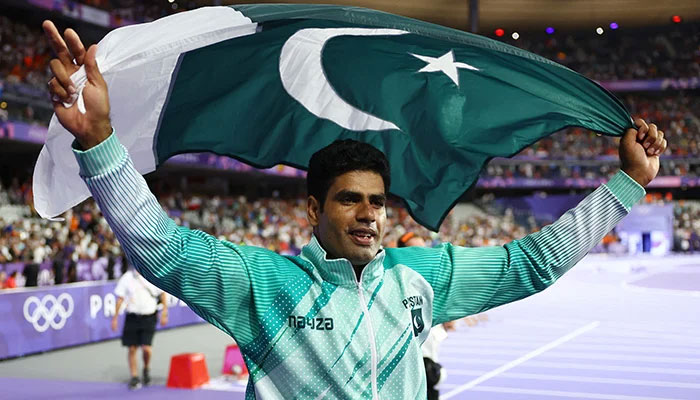Beyond the medal
We are likely to see avalanche of brand endorsements and govt representatives coming in to take credit
With Arshad Nadeem’s historic and record-breaking win, hearts across Pakistan have swelled with pride.
In this time of economic distress, this win offers a ray of hope that, despite all obstacles, Pakistanis are an unstoppable force. We are likely to see an avalanche of brand endorsements and government representatives coming in to take credit. However, I hope that this win offers a moment for introspection for our government and can drive effective structural investments towards sports in Pakistan.
Two-thirds of the population in Pakistan is aged 24 or below. Pakistan’s youth bulge, if not managed correctly will become a curse more than a blessing. Our state needs to structurally invest in sports because of its multi-pronged benefits for young people.
The 2030 Agenda, adopted in 2015 by the United Nations, highlights that “sport is an important enabler of sustainable development”. Some of the benefits include personal development, confidence, positive mental health and cognitive development, improved perseverance, resilience, equity, and solidarity. Several development actors also consider it an important tool for social cohesion, tolerance and conflict prevention.
We need an integrated and holistic youth in sports policy. Hafsa Ali and Richard Wright recently observed that Pakistan’s sports policy and underlying structures fall short of modern international sports requirements, and reform is strongly recommended. The development and delivery of a sports policy is adversely affected by administrative inefficiencies in organizational structures. They observed that there is an acute lack of public and private sector investment in this area. The meagre funds allocated are unjustly distributed.
Arshad Nadeem’s win is entirely his own. With next to minimal state support, he and his local community in Mian Channu pooled resources to get him where he is today. Imagine what heights we can achieve with the right enabling environment and support.
One of the first focus areas for sports should be schools. Public school playgrounds can be used to nurture raw talent and identify promising career sportspeople. Talented children can be connected to a network of trained coaches who can hone raw talent for domestic and international sporting events and competitions.
On coaching, we need to invest in programmes for the training of coaches. We need to expand upon and invest in trained coaches on the state payroll. The coaches can have actionable KPIs like mentorship, and a number of sporting events to ensure accountability and results.
Our government can either directly invest, or encourage private investors to financially support local sports clubs, training camps, and community sporting events. We critically need sports financial aid or scholarship programme to cover participation costs and equipment of underprivileged youth.
Financial barriers to entry need to be effectively reduced for young people to meaningfully engage and participate. There is a need to foster an ecosystem of local, national and regional sporting competitions so young people can compete in formal events and gain experience.
From an administrative perspective, we need a restructuring of the Pakistan Sports Board. We need to think beyond major sports like cricket and invest in other sports as well. We also need to add performance indicators for staff to reduce the inefficiencies.
Apart from the recent strides made for female cricket, women in sports remains a largely untapped area as well. We need to encourage and invest in women wanting to pursue a career in sports. This work will need to be supplemented by social norms or behavioural change to drive social acceptance towards the inclusion of women in this career track.
With the right investments, intentions and steps, I hope to see Arshad’s win translate into hope for future athletes who can go on and achieve new heights of success.
The writer is an independent policy expert.
-
 Funeral Home Owner Sentenced To 40 Years For Selling Corpses, Faking Ashes
Funeral Home Owner Sentenced To 40 Years For Selling Corpses, Faking Ashes -
 Why Is Thor Portrayed Differently In Marvel Movies?
Why Is Thor Portrayed Differently In Marvel Movies? -
 Dutch Seismologist Hints At 'surprise’ Quake In Coming Days
Dutch Seismologist Hints At 'surprise’ Quake In Coming Days -
 Australia’s Liberal-National Coalition Reunites After Brief Split Over Hate Laws
Australia’s Liberal-National Coalition Reunites After Brief Split Over Hate Laws -
 DC Director Gives Hopeful Message As Questions Raised Over 'Blue Beetle's Future
DC Director Gives Hopeful Message As Questions Raised Over 'Blue Beetle's Future -
 King Charles New Plans For Andrew In Norfolk Exposed
King Charles New Plans For Andrew In Norfolk Exposed -
 What You Need To Know About Ischemic Stroke
What You Need To Know About Ischemic Stroke -
 Shocking Reason Behind Type 2 Diabetes Revealed By Scientists
Shocking Reason Behind Type 2 Diabetes Revealed By Scientists -
 SpaceX Cleared For NASA Crew-12 Launch After Falcon 9 Review
SpaceX Cleared For NASA Crew-12 Launch After Falcon 9 Review -
 Meghan Markle Gives Old Hollywood Vibes In New Photos At Glitzy Event
Meghan Markle Gives Old Hollywood Vibes In New Photos At Glitzy Event -
 Simple 'finger Test' Unveils Lung Cancer Diagnosis
Simple 'finger Test' Unveils Lung Cancer Diagnosis -
 Groundbreaking Treatment For Sepsis Emerges In New Study
Groundbreaking Treatment For Sepsis Emerges In New Study -
 Roblox Blocked In Egypt Sparks Debate Over Child Safety And Digital Access
Roblox Blocked In Egypt Sparks Debate Over Child Safety And Digital Access -
 Savannah Guthrie Addresses Ransom Demands Made By Her Mother Nancy's Kidnappers
Savannah Guthrie Addresses Ransom Demands Made By Her Mother Nancy's Kidnappers -
 OpenAI Reportedly Working On AI-powered Earbuds As First Hardware Product
OpenAI Reportedly Working On AI-powered Earbuds As First Hardware Product -
 Andrew, Sarah Ferguson Refuse King Charles Request: 'Raising Eyebrows Inside Palace'
Andrew, Sarah Ferguson Refuse King Charles Request: 'Raising Eyebrows Inside Palace'




